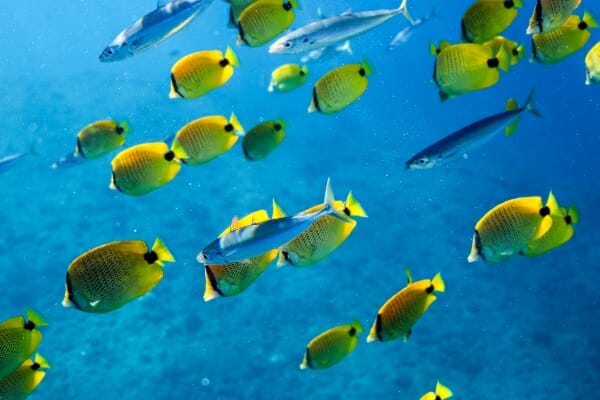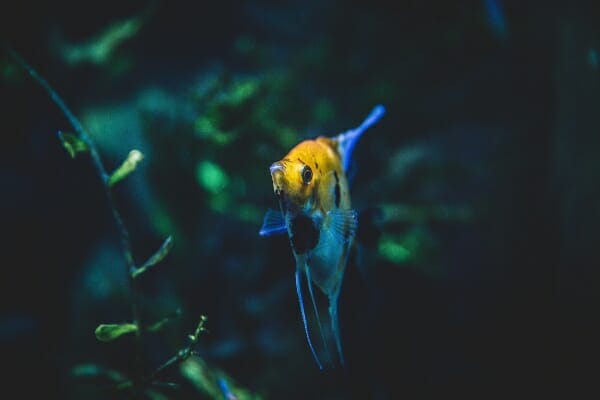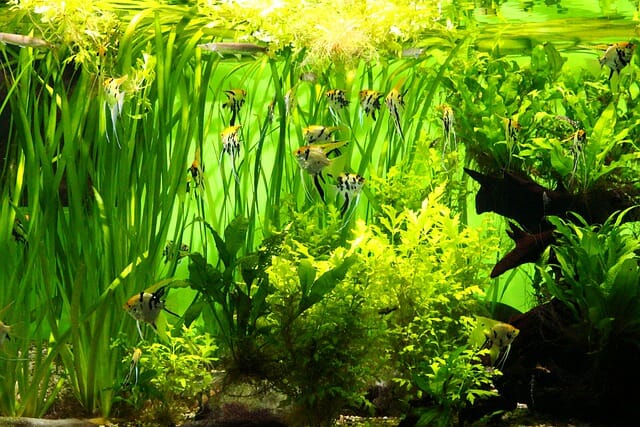Can Angelfish Live Alone: What to Expect and How to Make It Work

Angelfish are one of the most popular varieties of fish in the aquarium hobby. They are easy to keep, low maintenance, and come in various colors and patterns. Here we will provide a detailed description of the angelfish and some key characteristics.
An angelfish can live alone but may require additional care and adjustment. Additionally, other fish in the tank may interact, and some angelfish can become aggressive when they do not have a single stranger.
Table of Contents
How to Ensure Angelfish Can Survive Alone
Angelfish can live alone in a single tank, provided they have enough room to swim and plenty of hiding places. Ensure the water is clean and the environment stable – both of which are important for angelfish. Additionally, ensure plenty of company for your angelfish as social animals. The best way to ensure peace in the tank is by having newer and different fish for single adult females when you are looking at spawning with a male.
Can Angelfish Live Alone in Community Tank?
An angelfish can live in a community tank provided they have plenty of space and other fish they can interact with. Ensure the water is clean and stable and provide good hiding spots for the angelfish. Additionally, be sure to introduce any new fish slowly not to upset your angelfish’s delicate ecosystem balance.
What Can Happen if Your Angelfish Is Alone in a Tank?
Angelfish are social animals and will suffer if they are kept alone in a tank. They may become aggressive or territorially defensive, and their overall health may decline. Additionally, other fish in the tank may interact negatively with an angelfish solo occupant, harming its health.
Stress
Angelfish are sensitive to stress and suffer from it if kept alone in a tank. Poor water quality, a lack of privacy, or overcrowding can increase stress levels in an angelfish. If you choose to keep your angelfish solo, provide good hiding spots and stable water conditions for them. Additionally, consider adding other fish that the angelfish can interact with socially – this will help reduce their stress levels and ensure their well-being.
Loneliness
Loneliness is one of the biggest dangers for a lone angelfish occupant in a tank. Loneliness can lead to behavioral changes, such as aggressive tendencies, and can also cause physical problems such as depression and stress-related illness. Be sure to add other fish to your tank gradually, so the angelfish have time to get used to them and build positive relationships. If you choose not to keep any additional fish in your tank with your angelfish, ensure that they have adequate hiding spots and plenty of toys, so they do not feel lonely.
Loss of Appetite
A loss of appetite is another common problem faced by angelfish that are kept alone in a tank. Loneliness and stress can decrease the fish’s desires, which can be troublesome for their overall health. For example, if you notice your angelfish losing weight or not eating as much as usual, consider adding other fish to their tank gradually, so they do not feel threatened or stressed. Additionally, ensure to provide them with a diverse diet to help them stay healthy and content.
Lethargy
Lethargy is another common problem faced by angelfish that are kept alone in a tank. Lack of stimulation and loneliness, and stress can lead to lethargy. Lethargy is a condition in which the fish becomes unresponsive and listless, often swimming around their tank but not making any moves or sounds. For example, suppose you notice your angelfish exhibiting any signs of lethargy, such as sluggish behavior or stopped swimming. In that case, it is essential to bring them in to see a veterinarian as soon as possible. While there is no guarantee that a visit to the vet will cure lethargy, it may be the best step in helping your fish get back on their feet.

Why Is it Better for Angelfish to Be in Groups?
Stress Avoidance
As mentioned before, loneliness and stress can decrease the fish’s appetites and overall health. Having companions around eliminates some of the potential sources of stress in your angelfish’s life, which can help them stay healthy and content.
Mating and Breeding
Adding other fish to your tank may help angelfish feel less threatened and stressed, but it is also essential to provide them with a diverse diet to continue mating. A varied diet includes frozen foods, live plants, and small invertebrates. By providing your angelfish with these types of goodies, they will be able to find the partners they need to reproduce successfully.
More Energized Fish
As angelfish are territorial and tend to be solitary creatures, they require much energy to survive. Keeping them with other fish reduces their stress levels and helps them conserve their energy, making it easier for them to live longer and healthier lives.
Confidence and Activeness
One of the benefits of having companions around is that they provide an outlet for your angelfish energy. Having a friend to interact with boosts their confidence and encourages them to be more active, leading to a healthier lifestyle overall.
How Many Angelfish Should You Keep in a Group?
Generally, angelfish can live happily in groups of three or four. If you have more than that, you may take advantage of their space, and they may become territorial. Additionally, parasitic infections are dangerous if you keep more than one angelfish in a tank with each other.
Minimum Group Size
Three or four specimens is the minimum number of fish you can house in a group without becoming territorial. If you have more than this, they might not get along, and efforts to feed or keep them clean may become more complex.
Ideal Group Size
The ideal group size for angelfish is six to eight specimens. This allows them to have enough room to move around, as well as provides them with plenty of socialization opportunities.
Best Tank Mates for Angelfish
A good tank mate for an angelfish should be similar in size and shape and have a compatible diet. The best candidates include dwarf gourami, lionhead catfish, corydoras, and kuhli loach.
